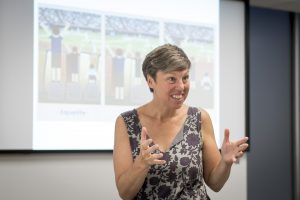Privilege and Oppression: Two Sides of the Same Coin
November 23/2016
By: Alyson Musial, Communications Officer, Department of Physical Therapy, U of T
As healthcare providers, how do we think and talk about privilege?
How do we understand issues of oppression?
Are we able to identify and analyze our own positions of advantage?
Stephanie Nixon is facing these difficult questions head-on. While they might make some people uncomfortable, Nixon says they are important to consider, and are not asked frequently enough.
Her research takes an introspective and raw look at equity and inclusion in health care,  education and research. “I like to view the privilege/oppression dynamic as a coin” explains Nixon, Associate Professor in DLSPH’s Social and Behavioural Heath Sciences Division.
education and research. “I like to view the privilege/oppression dynamic as a coin” explains Nixon, Associate Professor in DLSPH’s Social and Behavioural Heath Sciences Division.
“On the one side, you have societal patterns that give certain groups of people an unearned advantage based on factors such as race, gender and ability. On the flip side, you have patterns that give certain groups of people an unearned disadvantage based on those same patterns.” Essentially, the flip of a coin can affect the advantages or disadvantages bestowed upon you by something beyond your control.
Nixon, who is the Co-Founder and Director of the International Centre for Disability and Rehabilitation and an Associate Professor in the Department of Physical Therapy, will be presenting her work at the Edith Aston-McCrimmon Lectureship at McGill University on November 24, 2016 in a presentation titled “Global Health and Rehabilitation: New Perspectives on Equity and Inclusion.” She will lead an interactive workshop to engage her broad audience in exercises designed to increase their understanding of how privilege operates. She believes this ‘wake up’ can help educators, researchers and clinicians enhance their capacity to address health inequities.
Nixon prefers the term ‘intersectionality’ to discuss issues of privilege and oppression. “For example, as a white, able-bodied person, I experience unearned advantages in society,” she explains. “However, as a woman, I also experience disadvantage through dynamics of sexism. All of us simultaneously inhabit positions of privilege and oppression, and my work is about exploring and exposing the societal patterns that perpetuate these unearned roles.”
Having the capacity to analyze one’s own positions of privilege is missing from most healthcare training, according to Nixon. “When I present these ideas, my audience is typically well educated and employed. Many are in positions of power within healthcare. So, this topic is delicate, in that it forces people to reflect on their own experiences of unearned advantage, which can be unsettling at first.”
Nixon argues that ultimately the goal of healthcare providers is to ensure health equity. Only by taking a critical view of the unfair barriers that exist in our society, she notes, can inequities in healthcare and rehabilitation be dismantled.